Opening Film Documentary
Saturday, 6. October, 19pm
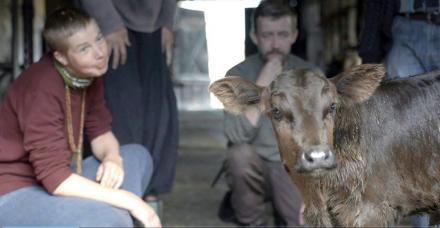
Wies plywajacych krow / The Village of Swimming Cows / Das Dorf der schwimmenden Kühe
Poland, Britain Germany / 2018 / Documentary / 78 min
OT German / UT English
An extremely funny comedy about an unusual encounter of three neo-hippies from Berlin with Polish farmers in Poland. Two different worlds are colliding. In order to get close to nature, and looking for a special work experience as well, Ellen, Mario and Jon go east. In a small Polish village near the border to Belarus they rent an old wooden house. They meditate, practice acroyoga, seek contact with the people living in the village and help them in agricultural work. For the village dwellers, they are absolutely exotic. Is this new healthy life style just a temporary fad of the city people, or will it change the world …? A film about people with very different philosophies of life, who – despite all communication gaps and controversies – seek friendship and exchange. A humorous and friendly invitation to let differences gain fruit.

Director: Katarzyna Trzaska, Producer: Robert Zygmuntowski,
Script: Katarzyna Trzaska, DoP: Andrzej Wojciechowski,
Editor: Marek Kucharski, Sound: Anna Rok Agata Chodyra, Music: Bart Palyga
Katarzyna Trzaska’s documentary debut after studying at the Krzysztof Kieslowski’s Department of Film and Television in Katowice, in Poland: “10 Years to Nashville” was shown at 11 international festivals. She is a co-founder and member of the Board of Polish Female Filmmakers Association and deeply engaged in the feminist moves in the film industry in Poland.With her son she lives in Warsaw. In her films she tries to combine documental observation, a lot of humour and warm approach to her characters and puts a lot of emphasis to visual side of her films.
Block 4 - Animationsfilm / Dokumentarfilm
Sunday, 7. October, 18pm
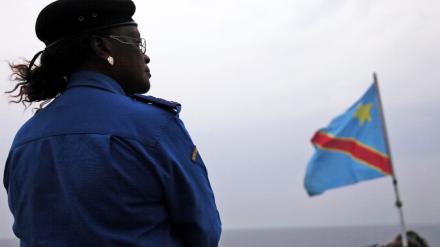
Maman Colonelle / Mama Colonel /
Congo, Democratic Republic, France / 2017 / Documentary / 72 min
OT Lingala / UT English
Colonel Honorine Munyole is an impressive person, 44 years old, widowed, and mother of seven small children. It is with pride that she wears her bright blue uniform, and it also gives her the protection necessary for her daily job. She commands a small police unit that is devoted to the protection of abused women and mistreated children in the war-troubled regions of the Congo. With deep respect, the population call her “Mama Colonel”. With her strong commitment, she is - despite all adversities – an authority figure for many women and children, but she is also the person who gives them comfort and her attention. Honorine Munyole is a listener as well as a voice for the victims of violence, but often she remains struck dumb by the stories she is told. Yet she gives hope to women and children, and she shows to everybody that these people are not just victims but can influence things.

Director: Dieudo Hamadi, Producer: Christian Lelong, Kiripi Katembo Siku,
Script: Dieudo Hamadi, DoP: Dieudo Hamadi,
Editor: Anne Renardet, Sound: Dieudo Hamadi, Music: -
Dieudo Hamadi was born in Kisangani (Democratic Republic of the Congo) in 1984 and studied Medicine in 2005-2008. He then attended several documentary workshops. Dieudo Hamadi is author of two short documentaries that caught the attention of several festivals in Europe and Canada.
Block 7 - Dokumentarfilm
Monday, 8. October, 20pm
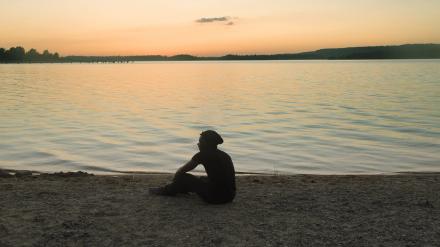
Habitat /
Germany / 2017 / Documentary / 79 min
OT German / UT German
After the fall of the GDR, in the Geisel valley a former opencast mine was flooded and renatured and thus became the largest artificial lake in the whole of Germany. What are the people doing here? From his allotment garden, Reinhard Hirsch views the spot in the lake where the former house of his grandparents stood. His native village Zöbigker had to give way to mining. On the abandoned mining dumps the bee-eater nests, a colourful migratory bird with an unmistakable call. Sitting with her camera in the ruins of a former industrial area, Christine Lattke is waiting for the return of the bird from his winterquarters in Africa. In a small bay on the shore Ganiyou Idriss from Niger spends his monotonous days waiting for the outcome of his asylum procedure. In Glück-auf Street, a former miners’ settlement named after their traditional greeting (meaning ‘good luck’), lives the Kurdish poet Farhan Kalasch. Having been granted asylum in Germany, he is now trying to get his wife and children to join him. The film by Emerson Culurgioni and Jona Matauschek shows us a world between sterility and life, between digging one’s heels in and wanting to leave.

Director: Emerson Culurgioni & Jonas Matauschek, Producer: ROSENPICTURES Filmproduktion GbR,
Script: Emerson Culurgioni & Jonas Matauschek, DoP: Jonas Matauschek,
Editor: Emerson Culurgioni & Jonas Matauschek, Sound: Emerson Culurgioni, Music: Roßbacher Musikanten
Jonas Matauschek was born in Dresden in 1987. In 2014 he graduated with a diploma in photography from the Academy of Visual Arts Leipzig (HGB) and is now a grant holder in the German National Scholarship Foundation. In 2012 he co-founded the Film Action Group Leipzig ‘FILZ’ together with Emerson Culurgioni. Emerson Culurgioni lives and works as an artist and documentary filmmaker in Leipzig. He studied in Bolzano (IT) until he moved to the Academy of Visual Arts (HGB) in Leipzig in 2010 in the field of media art. In 2014 he graduated with the short film LEUNA ('13). He was a participant in the Professional Media Masterclass (PMMC) and the PMMC Lab. He was also co-founder of the Leipzig Film Festival (FILZ) in 2012. At the end of September 2018, he is expected to complete his master class examination with Clemens von Wedemeyer in the class Excinema.
Block 9 - Dokumentarfilm
Tuesday, 9. October, 20pm
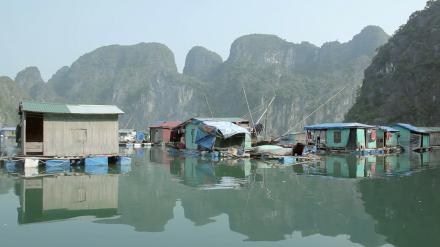
Farewell Halong / / Lebwohl Halong
Germany, Vietnam / 2017 / Documentary / 98 min
OT Vietnamese / UT German
The impressive Halong Bay in Vietnam harbours a great number of swimming villages. One of their inhabitants, 46-year old Nguyen Van Coung, lives with his family in this very special habitat. For him and his family, life on the water is normal. For generations, his family has slept, cooked and worked here. However, as the Halong Bay has appeared on the prestigious World Heritage List of UNESCO, the Vietnamese government saw itself forced to conduct the largest resettlement programme in the north of Vietnam. The customary rights and the culture of the inhabitants had to give way to nature protection and the tourist business. Goung and his family must leave their extraordinary home and exchange their life on the water for life on the ground in a new settlement. The government guarantees financial compensation and also gives them new homes, but how will people fare far from their customary living space?They are suspicious of the new beginning as they have no idea what their life is to be like after the loss of their former habitat.

Director: Duc Ngo Ngoc, Producer: Christoph Kukula & Eike Goreczka,
Script: Duc Ngo Ngoc, DoP: Pham Ngoc Lan,
Editor: Gudrun Steinbrück, Tien Dat Nguyen, Sound: Florian Marquardt, Music: Martin Kohlstedt
Duc Ngo Ngoc is a Vietnamese-German filmmaker. He was born in Hanoi in 1988. At the age of five he moved to Berlin. From 2010 to 2014 he studied Media Design /Media Art at the Bauhaus University Weimar and graduated as a B.F.A. In 2013 he co-founded the film group KAMMER 11 together with four other filmmakers. Since October 2015 he has been studying for a Master of Arts degree in film direction at the Film University KONRAD WOLF in Babelsber. He also completed a term at the Hanoi Academy of Theatre and Cinema as a guest.
Block 10 - Kurzspielfilm / Dokumentarfilm
Wednesday, 10. October, 18pm
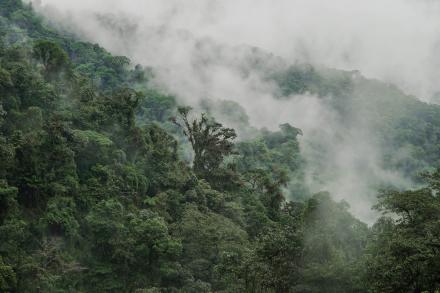
Dusk Chorus - Based On Fragments Of Extinction By David Monacchi / / Der Chor der Dämmerung - nach „Fragments of Extinction by David Monacchi”
Italy / 2017 / Documentary / 62 min
OT Italian / UT German
David Monacchi is a sound artist, sound explorer and eco-acoustic composer. For 15 years he has been conserving the sounds of the rainforest in his project ‘Fragments of Extinction’. With high-resolution 3D microphones he is trying to capture the soundscape of various places and to access the living space of the species through listening to them. Every animal, every plant communicates on its own frequency, without interfering with the interaction of other life forms. It is only the intervention of humans that destroys this sensitive balance.The biosystem with the greatest diversity of species on Earth is losing its sounds. Monacchi calls it ‘the quiet catastrophe of our time’. In the rainforest of Ecuador he is trying to capture and conserve the acoustic fragments that are still present in order to preserve those sound tracks for future generations.The directors Nika Šaravanja and Alesandro D’Emilia accompagnied David Monacchi during his work in the rainforest. The result is a symphony of nature. It slowly develops from a sequence of images to a listening experience.
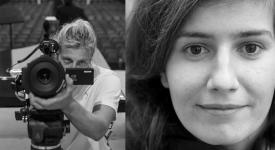
Director: Alessandro D'Emilia, Nika Saravanja, Producer: Heidi Gronauer, Lorenzo Paccagnella,
Script: David Monacchi, DoP: Alessandro D'Emilia,
Editor: Otis Buri, Sound: David Monacchi, Music: David Monacchi
Alessandro was born in Rome in 1988. He became soon passionate in climbing, skiing and slacklining. Practicing these activities he developed a strong interest in the audiovisual sector, in particular remain fascinated by the mysteries of nature, from the unexplored places, the different styles of life and thought of mankind. In 2016 He graduated in photography at Zelig, school of documentary. Nika Šaravanja is a Croatian documentary filmmaker and visual artist. After studies on the Zagreb School of Economy and Management in Zagreb, she spent many years traveling, doing social work and collaborating and exhibiting with various artists and NGO's. She graduated on the Zelig school for documentary and new media in directing class and her work consists of mainly social impact & environmental oriented documentaries. "Dusk Chorus- based on fragments of extinction" was her first feature documentary. She is currently living in Vienna and working on her second feature film.
Block 12 - Animationsfilm / Dokumentarfilm
Thursday, 11. October, 18pm
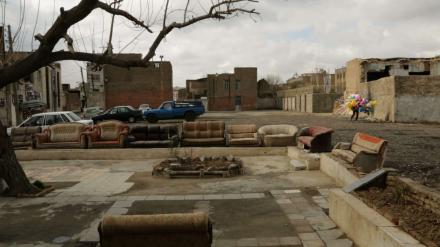
Hashti Tehran /
Iran, Deutschland / 2017 / Documentary / 59 min
OT Persian / UT German
In most traditional houses in Iran ‘Hashti‘ refers to an octagonal hallway from which visitors are led to other parts of the building, to the private rooms or to the semi-private ones, which are reserved for the reception of out-of-town visitors. Starting from the idea that Tehran itself represents a house, the film follows all four directions of the compass, to the periphery of the city. It leads us to transitions between inner and outer spaces, to marginal zones between urban and non-urban areas. Hashti Tehran ‘examines’ housing construction and city development in very different areas, in the mountains of Tochal in the north, in the region around the artificial lake Chitgar in the west, in Pardis Town, a settlement with social buildings far in the east, and in the Nafar Abad quarters at the southern periphery of the city. Enormous differences become visible.
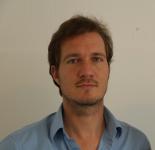
Director: Daniel Kötter, Producer: Sadra Keyhani,
Script: Daniel Kötter, DoP: Daniel Kötter,
Editor: Daniel Kötter, Sound: Hedieh Ahmadi, Marcin Lenarczyk, Music: -
Daniel Kötter is an internationally active filmmaker and a director of musical theatre. His projects touch different medial and institutional contexts and combine techniques of structuralist experimental films with performative and documentary elements. Visual research again and again leads him to the African continent and to the Middle East. Among other efforts, he currently works with the curator Jochen Becker (metroZones) on the research, exhibition and film project ‘CHINAFRIKA. Under Construction’.
Block 14 - Dokumentarfilm
Friday, 12. October, 18pm
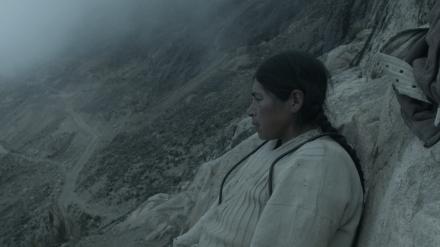
Cuando el toro lloró / When the Bull cried / Als der Bulle weinte
Belgium, Bolivia / 2017 / Documentary / 66 min
OT Spanish / UT English
Mining on one’s own is life-threatening work. In the mountains of Bolivia some people earn their living this way. Without any assistance they creep through the dark and coldness and blow up the tunnels with dynamite wherever they hope to find something. Karen Vázquez Guadarrama and Bart Goossens accompagnied these women and men into the mountain. They show their troublesome search for ore and capture the fear that follows them with every step. The outdoor life they can finance on the basis of their low yields is meagre, dusty and poor. A social order that they can hold on to and that gives them courage for the next day can only be established by religious ritual. So in a wild ceremony of sacrifice with large amounts of alcohol they summon ‘El Tio’, the God of Darkness. A film about what people can do and what it costs them.
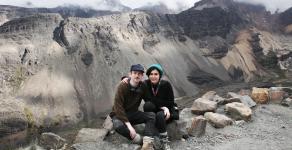
Director: Karen Vázquez Guadarrama & Bart Goossens, Producer: Tomas Leyers,
Script: Karen Vázquez Guadarrama & Bart Goossens, DoP: Karen Vázquez Guadarrama,
Editor: Tom Denoyette, Sound: Bart Goossens, Music: Bram Bosteels
Karen was born in Mexico City and studied Film at the Royal Academy of Fine Arts in Belgium's Ghent.
Block 15 - Dokumentarfilm
Friday, 12. October, 20pm
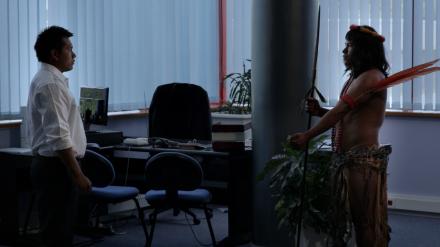
Anuktatop: la métamorphose / Anuktatop: The metamorphosis / Anuktatop: Die Metamorphose
France, French Guiana / 2016 / Documentary / 107 min
OT French / UT English
In the immediate vicinity of a space port in French Guyana live the members of the Wayana tribe. Even though their life is hidden in the dense rainforest of the Amazon River, the changes in the world do not pass them unnoticed. In their dreams these people combine the here and there, the past, today and tomorrow. Grandmother Malilou dreams of her early life in the fifties. Young Stephane dreams of a friend who belongs to another tribe. And Derrek dreams of the mythological world of the Wayana warriors. The film made by Nicolas Pradal and Pierre Selvini fuses occult traditions, light shows, staged images, very simple talks and everyday actions. The filmmakers’ procedures are ethnographic as well as artistic, they accompagny their protagonists with their cameras and also make self-expression possible. If you want to follow them, you should dream yourselves into their film.
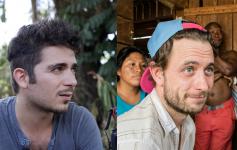
Director: Nicolas Pradal and Pierre Selvini, Producer: David Crochet,
Script: Nicolas Pradal and Pierre Selvini, DoP: Tarek Sami,
Editor: Fabien Daguerre, Sound: Cesar Mamoudy, Music: Pierre Selvini
Nicolas Pradal was born in Meaux (France) in 1984. After studies in Sociology and Anthropology, he enters the ESAV (Toulouse’s audio-visual superior school). His graduation movie “Les rêves et la loi” (dreams and laws) frontly shows the complex situation of Aboriginal people in Australia. This trip is the key to many subjects he has been studying since then. In 2009 he begins a documentary in French Guyana in Native American territory. This touchy topic brings him to the point where he decides to make participative movies. Pierre Selvini turned to musicology, aimed physics research of musical acoustics. He finally enters the ESAV (Audio-Visual Superior School, Toulouse, France). On his arrival in Paris, he first worked as a sound engineer and composer, but in parallel develops a project and a friendship with Nicolas Pradal. Their willingness to get involved humanely with natives in French Guiana will push them to create an associative, participatory project that will last more than 7 years.


